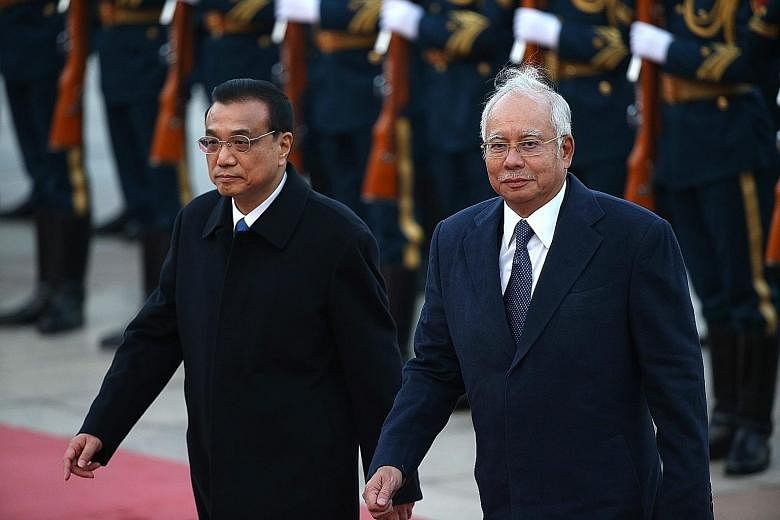China and Malaysia have inked 14 agreements, with one involving the sale of Chinese naval vessels, reflecting their warming ties amid a tussle for regional influence between Beijing and Washington.
The nine government-to-government pacts and five business cooperation deals, signed as part of Malaysian Prime Minister Najib Razak's six-day visit to China from Monday, included one on Chinese financing for a Kuala Lumpur-Kelantan rail line and another for building a gas pipeline in Sabah.
Datuk Seri Najib, who is making his third visit to China since becoming Prime Minister in 2009, met Premier Li Keqiang and top legislator Zhang Dejiang yesterday and is scheduled to meet President Xi Jinping tomorrow.
Reuters yesterday quoted an unidentified Chinese official as saying that China was selling four vessels to Malaysia.
Malaysian state media reported after Mr Najib's meeting with Mr Li that of the four vessels, two will be built in China and two in Malaysia.
The Star newspaper quoted Mr Najib as saying at a press briefing: "I call this a landmark decision because before this, we had not bought such vessels from China."
The vessels are Littoral Mission Ships (LMS), fast patrol vessels that can be equipped with a helicopter flight deck and to carry missiles. They are said to cost around RM300 million (S$100 million) each.
Chinese Vice-Foreign Minister Liu Zhenmin told reporters yesterday that both sides are focusing on naval cooperation and that the two premiers also have pledged to handle South China Sea disputes bilaterally. "That is because improving mutual trust between our navies is very important to ensuring peace and stability in the South China Sea," Mr Liu said. "But the start of naval cooperation itself is a big event in our bilateral ties, showing our political mutual trust has reached a very high level."
Singapore-based military expert Richard Bitzinger of the S. Rajaratnam School of International Studies said the Chinese vessels are a bargain compared with the French-designed Gowind-class corvette, of which the Malaysians are buying six at around US$466 million (S$647 million) each.
"When it comes to armaments, quality has always been a problem for the Chinese, but they have also made great strides in closing the quality and capabilities gap with the West," he added. "That said, I doubt if the Chinese LMS are as good as the Gowind-class, but the Malaysians are probably happy to add some quantity to the Royal Malaysian Navy."
Mr Najib is the third leader of an Asean claimant state embroiled in the South China Sea territorial disputes to visit Beijing in recent months. The others were Philippine President Rodrigo Duterte in mid-October and Vietnamese Prime Minister Nguyen Xuan Phuc in September. The other claimants are Brunei and Taiwan.
Chinese media has depicted these visits as proof of warming relations with Asean nations, particularly with claimant states, despite Beijing's rejection of an international tribunal ruling in July that invalidated China's territorial claims.
Several foreign media reports, however, have suggested that China is flexing its financial muscle to improve relations. But Mr Liu yesterday dismissed such perceptions, saying: "As China's economy grows, we are keen to strengthen practical cooperation with all countries, including our neighbours."
Malaysian Deputy Prime Minister Ahmad Zahid Hamidi, speaking yesterday to reporters on the sidelines of a counter-terrorism conference in Singapore, also dismissed the view that Kuala Lumpur is cosying up to Beijing as its ties with Washington are cooling.
He said: "I think it is very subjective for anybody to regard it as (a) warm or cold relationship, but we would like to have balanced and good relationships with both countries."

